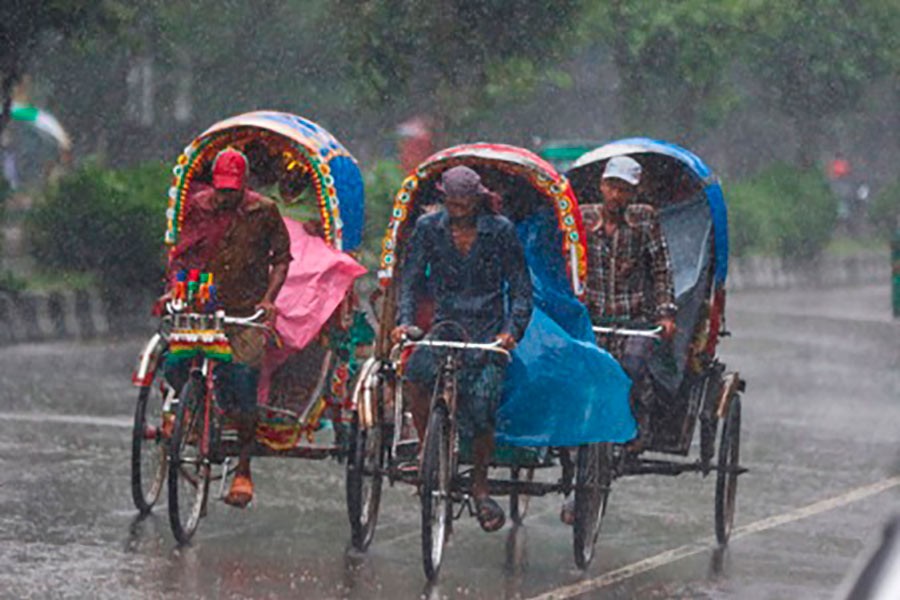Mokbul Mia came to Dhaka from Jamalpur to escape the curse of landlessness and provide for his family of three daughters, a wife and an old mother - all of whom are completely dependent on him.
In Dhaka, he pulls a rickshaw almost the entire day, and the money he earns in his words is enough to fulfil most of the necessities of his family back home.
But he doesn’t want to live in Dhaka for one reason, which is a lack of respect from people.
"In my village, although I didn’t have anything, people didn’t look down on me like the way they do here.
“I am a man of forty-seven years, even school going kids say ‘Ei Rickshaw Jabi/jaba’ when they are trying to hire my rickshaw. It’s painful, but I cannot do anything about it. I have to live with this fact that I don’t belong to this society," a sad Mokbul Mia expressed his frustrations while talking to the writer.
Like Mokbul Mia, millions of rickshaw pullers in this city have similar stories. People talk with them condescendingly and although the conversation goes well at first with being called Mama from the other end, a slight altercation about the rickshaw fare turns nasty in the span of a very short time, with the rickshaw puller getting hurled abuses and getting reminded of their position in the society.
Rickshaw pullers aren’t the only sufferers. People involved in similar chores like helpers and conductors of public buses, auto drivers, day labourers and many more belonging to the working class suffer from a lack of minimum respect.
They are at times rebuked by people who are way younger than them, as social standing appears to be the more determining factor of earning respect in such social scenarios.
The tendency of showing the power
Mashahed Hassan Simanta, a published author and YouTuber, who also happens to be the Managing Director of the Institute of Training and Management, shared his view in this regard.
"We are always used to pretending to be important and powerful. And that is why we do not feel comfortable honouring rickshaw pullers who are in a vulnerable position by economic standards.
“Rather, we want to exercise so-called power. It is not just rickshaw pullers, housemaids, day labourers, and even in the raw market, we apply our high voice in the daily bargaining.”
Interestingly, Simanta finds a connection between seeking attention by trying to be forcefully outspoken at every chance, with that of not honouring elderly 'rickshaw-wala mama'.
“As Millennials, we always want to be in the spotlight, to seek attention. Bargaining with rickshaw pullers for us is an example of a kind of outspokenness. Here our address is symbolic. With the slightest hint, we want to make it clear that we are above them."
Generations changed, habits didn’t
Although many might want to conclude by saying these phenomena are recent with the rapid urbanisation and a radical change of values when compared with the past, this does not appear to be a recent thing and people of such socioeconomic standing have been on the receiving end of slanders and abuses for a long time.
From the experience of former additional secretary Mahmud Hassan, "This kind of display was a common phenomenon in our time too. Many around me despised the rickshaw pullers, kept them seated, or paid less than the agreed fare.”
“Rickshaw fare from Dhaka College to New Market was Tk 2. I was trying to raise 1 taka there. Sometimes I wanted to talk to them and get acquainted with them. But most of the people used rickshaw pullers as a display of hidden arrogance."
A noble thing we can learn from the West
Compared to the developed countries, especially with those in the western hemisphere, Bangladesh has a strict and well-defined class hierarchy. It is the principal reason due to which the rickshaw-pullers, as well as the relatively less upwardly mobile section of the society, are not respected and at times even dehumanised.
Iftekhar Ahmed Sakib, a third-year student at Shaheed Suhrawardy Medical College and Hospital, Dhaka, recently visited the United States. Comparing his experience in the United States with his day to day life in Dhaka, he said,
"I have seen that in the USA, people give tips to riders in Uber or taxi which amounts to at least 25 per cent of the original fare. I simply can't understand why we need to negotiate with a rickshaw puller on a fare?”
Sakib rightly points out the lack of fare regulation and policies which makes rickshaw pullers vulnerable to unfair exploitation.
“What if a rickshaw puller is sick for 7 days? His whole family has to starve with him. Is there any health insurance company safeguarding them? What if a rickshaw puller has cancer? We can hardly imagine the cost and this humanitarian scenario. There comes the question, are we treating the hardworking souls well? "
Don’t just respect ‘age,’ respect a human being
Rickshaw pullers come from some of the most backward sections of our society. They work hard to make their ends meet.
In a country like Bangladesh which is rabid with extreme class discrimination, they do not have it easier in the field of dignity and respect either. It is often seen that people who do not have any hardships economically, rob the rickshaw pullers off by giving less fare and taking the advantage of their weaker social position.
A 'rickshaw-wala mama' is also a human being who works hard with cent per cent honesty to bring food to the table of his family and a roof above their head.
It’s not that a rickshaw puller has to be elderly to be respected. Every human being deserves respect and in the civil Bangla language, there is a word in the dictionary that is applicable for all unknown people regardless of their age, gender and class which is ‘Apni,’ not ‘Tumi.’


